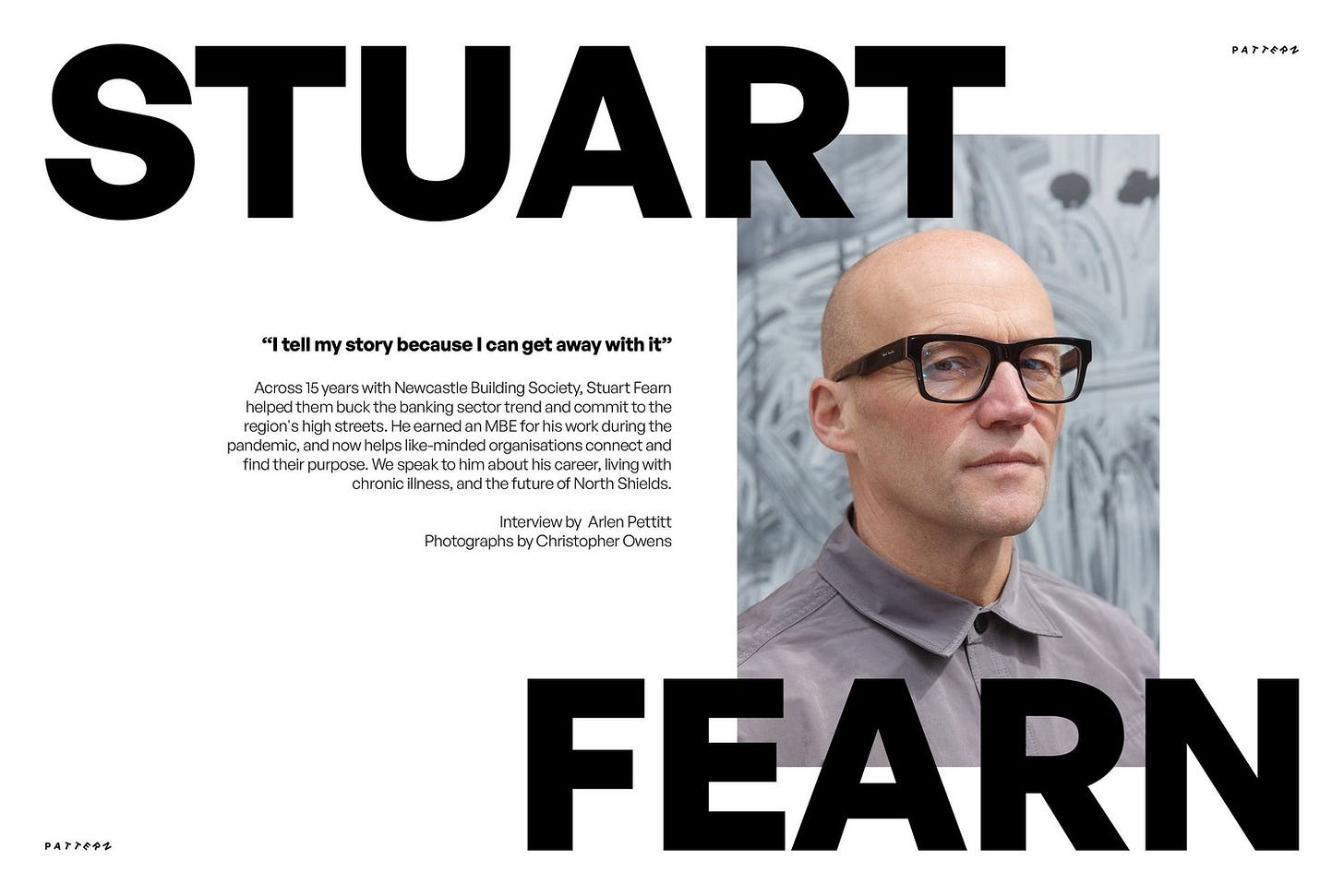Worse? Better? Or about the same?
Poverty, investment, advanced materials, an interview and a film
The Joseph Rowntree Foundation’s flagship report UK Poverty 2025 is out today.
It finds 21% of the UK is in poverty, that’s more than 14 million people.
That figure jumps up to 30% for children, and 40% for working-age lone parents, then 44% for the children of working-age lone parents.
In the North East, the stats show 600,000 people, or a bang on average 21%, are in poverty. That compares to 19% in bits of the South, and 27% in the West Midlands and 25% in the North West.
Okay, you might think, not great…but it could be worse.
Especially (as the report notes) seeing as the North East has high levels of working-age people out of work, high levels of workless households, high levels of child poverty in specific local authority areas, private rental price growth which has held at a high level while it has slowed elsewhere, a large increase in economic inactivity, and a median pay 10% below the UK average.
*takes breath*
Oh, hang on, what does this bit say…
“Data for the North East should be treated with caution; the yearon-year percentage point change in poverty rates for this region is over 4 times the change for other regions and nations on average. We will continue to monitor the trajectory of poverty rates by region in the coming years.”
Oh, right…so JRF don’t think it’s right either, and reckon there’s something funny with the data, but they aren’t sure what.
To quote noted Timothee Chalamet lookalike Bob Dylan, “you don’t need a weatherman to know which way the wind blows.”
Basically the data doesn’t pass the reality test. Things are difficult and don’t feel like they are getting better.
The report argues that economic growth alone isn’t enough to fix poverty, and the social safety net needs strenghtening too.
The North East Child Poverty Coalition agree, with chair Beth Farhat calling for the end to the two-child benefit cap and pointing out the chicken/egg scenario in the middle of this: “we know the hardship being experienced by so many families – both in and out of work – is itself acting as one of the single biggest barriers to growth and opportunity our local communities face.”
It’s opened up a clear dividing line as well between the North East mayor and the Tees Valley one.
At the start of the year Ben Houchen suggested ‘good well paid jobs’ were the solution to poverty, while Kim McGuinness has in the last couple of weeks said yes to high paying jobs, but that policy change is needed to address barriers to work - removing the two-child cap and addressing things like childcare, skills, transport for access to jobs, and the barriers like the NECPC mention above which come from living in poverty.
The North East’s £370m Advanced Material Electronics sector
The snappily titled Compound Semiconductor Applications Catapult has new report out looking at the economic impact of advanced material electronics on the North East economy.
For something I hadn’t even considered a thing until I saw this report, it’s a fairly sizeable estimate of impact they are making. £370m of GVA a year and 2,800 jobs across 58 firms.
Promisingly, the North East accounts for 19% of UK research outputs for the sector, which is better than we usually manage.
The full report includes details of the sector’s growth potential in the region, as well as barriers to be overcome, including the usual suspects of access to skills and access to funding.
“I tell my story because I can get away with it”
I’m sure plenty of you will know or have come across Stuart Fearn.
In his 15 years with Newcastle Building Society he was instrumental in the organisation’s doubling down of its commitment to the high street before, during and after the pandemic.
More recently he’s helped Society Matters develop its offer to businesses, not least on poverty awareness, and worked as an independent consultant helping peopel define and work towards their organisational purpose.
What you might not know is that he’s dealt with serious chronic illness for much of that time.
I spoke to him recently for Pattern, and you can read the full interview here, complete with striking imagery from Chris Owens of Stuart out around North Shields.
A regional approach to inward investment projects
Westminster loves saying it’s going to ‘turbocharge’ things. This last week they’ve said they have a plan to ‘turbocharge investment across the UK’.
I always wonder if they know how turbochargers work. They work by capturing hot exhaust gasses, which is what most of these press releases consist of.
This plan says the government will “work with local leaders across the UK to support places to build pipelines of incoming investment and projects linked to regional growth priorities.”
The North East and Liverpool are the first two areas chosen to work with the Office for Investment to draw on expertise nationally to deliver the private investment elements of regional growth plans.
Snide comment on turbochargers aside, I do think we need to approach investment differently.
Devolution brings a lot of public money to the North East, but not nearly enough to fix the problems the region is facing. And not nearly enough to deliver the projects on the region’s wish list, so that will need private investment too - the Leamside Line being the prime example.
However, the hot air already appears to be going out of this particular turbocharger, as the Chancellor is due to announce a load of investment into creating a ‘Silicon Valley’ between Oxford and Cambridge. Two places notorious for lack of investment, poor productivity, zero innovation and so in desperate need of a fresh start…clearly.
There are no new policies, there is just investment in the dense, black hole-like gravity of Oxford and Cambridge being announced again, and again and again.
A nice thing Durham Cricket are doing
Durham CCC are working with North East charity Handcrafted on a project helping unaccompanied asylum-seeking children.
Having started running cricket sessions in Chester-le-Street for the young people they work with, Handcrafted then established a partnership with Durham Cricket to take them to matches at the Riverside.
It’s all about helping the young people acclimatise and find a way to connect with Durham.
Harry Jennings at Handcrafted said:
“A lot of the children are from Afghanistan. We’ve got a lot of young people who are very interested in cricket, who get excited at the ideas of the big names that Durham have in terms of Ben Stokes and others that they saw [on TV] in Afghanistan and suddenly they’re in the same place as where these people are playing.”
(Thanks to cricket fan Will Mapplebeck for sharing this)
Newcastle Helix - The Future of Finance
If you’ve not been following Newcastle Helix’s film series, you should be.
Each one focuses on a different topic and looks to the future of that area, featuring experts from the North East.
The latest, on the future of finance, is out now and you can watch it on YouTube.
It includes the entrepreneur view, the business support view and the funder view, amongst others.
Working with me
As always, please do drop me a line on arlen@arlenpettitt.co.uk if there’s anything you think I might be able to help with.





A great post, and the bit about Reeves and her ‘silicon valley’ deserves to reach a wider audience. I have written to The Guardian today suggesting they run regional takes by regional writers like yourself, starting with you. Keep up the good work.🐰
For the record, my letter to The Guardian:
The Chancellor’s plans to create a ‘Silicon Valley’ between Oxford and Cambridge and extend Heathrow (Guardian, 29 January) contradict so much of what she says about wanting to help poorer regions. I did not know the places she has chosen suffer from a lack of investment, poor productivity, zero innovation and are so in desperately in need of a fresh start to quote North-Easterner Arlen Pettitt*
Surely the logical place for all this investment would be between Stockton and Darlington, and across the North and Midlands, this being the 200th anniversary of the world’s first passenger railway? They made it happen then. They can make it happen again.
* It is about time The Guardian made space for regional writers, thinkers and activists like Arlen Pettit, who I read on substack: (https://open.substack.com/pub/worroom)
Robert Howard